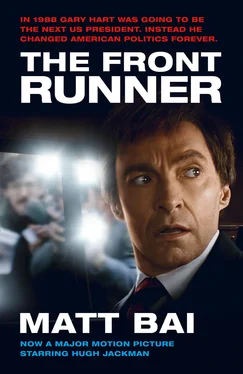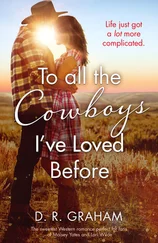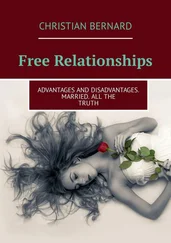Indeed, what had it gotten us, this violent compression of politics and celebrity and moral policing? You could argue, I guess, that it brought us closer somehow to our politicians, by making their flaws and failings harder to obscure. You could argue, and many have, that we deserved the information necessary to elect politicians who could be moral, trustworthy stewards of our children’s future, and so on. There was a word that encapsulated all of this, a concept that, more than any issue or ideology, came to dominate our campaigns long after Hart had retreated to Troublesome Gulch. That word was character. It wasn’t just about sex, as it was in Hart’s case, but also about whether you uttered a line you wished you could take back or made an investment you probably shouldn’t have, about whether you’d ever gotten stoned or written something idiotic in a school paper. Nothing mattered more in a politician than his essential character, and no shred of private behavior, no moment of weakness or questionable judgment, was too insignificant to illuminate it.
It would be facile to dismiss this new focus on character as being entirely trivial or misrepresentative. In a few cases, unfortunately, it was anything but. Consider the example of John Edwards. In June 2007, as the former North Carolina senator and vice presidential nominee was preparing to run a second time for the presidency, I wrote a highly detailed, eight-thousand-word cover story for The New York Times Magazine about his agenda, weighing with great seriousness his signature plan to combat poverty and inequality. I traveled with him to the devastated Ninth Ward in New Orleans, and I consulted a faculty’s worth of antipoverty experts on his proposals. At the time (and for a long while after), I congratulated myself on having taken the most substantive look at Edwards’s depth and rationale as a candidate, even while pundits continued to ignore his policies in favor of commenting on his floppy hair and his fundraising prowess and his wife’s battle with cancer. This was the kind of long-form examination that voters and candidates complained was lacking from political coverage.
Four months after my cover piece was published, the National Enquirer ran the first in a series of stories alleging that Edwards had fathered a “love child” with a filmmaker who was following him around. Edwards denied the story repeatedly, and the rest of the media mostly ignored it—until the following August, when the Enquirer caught him visiting his lover and his new baby daughter in a Beverly Hills hotel. After that, Edwards went on Nightline —much as Gary Hart had, under different circumstances, twenty-one years earlier—to admit that the child was his. By this time, he was no longer a presidential candidate, having withdrawn after getting drubbed by Hillary Clinton and Barack Obama in the early primaries six months earlier. But had things gone a little differently in Iowa or New Hampshire, it was not inconceivable that Edwards could have been the nominee by the time the full measure of his deceit became clear. He was, in any event, a likely pick for attorney general or some other cabinet post.
The revelation about Edwards’s personal behavior struck me as highly relevant to his fitness for office, though not simply because he had been sleazy and dishonest. (Edwards would not have been the first president, or even the second, to have secretly fathered a child out of wedlock.) As I had written in the magazine, most of Edwards’s “new ideas” for combating inequality, his main rationale for running, were in fact leftover proposals from the last century, and they were grounded in the underlying assumption that simply giving poor people more money would eradicate poverty—an assumption that ignored an emerging consensus about the importance of families and communities in that equation. About the only major plank of Edwards’s platform that even hinted at this broader social problem in impoverished communities was his insistence that absentee dads take responsibility for their children. And so here was Edwards, whose agenda included this ardent call for “responsible fatherhood,” refusing to publicly acknowledge his own child.
I could think of no condition under which I would have felt obliged to stake out the Beverly Hilton, waiting to confirm that John Edwards (or anyone else) was visiting his paramour and his illegitimate child. But at the same time, I found it impossible to argue that what the National Enquirer had done constituted any less of a service to the voters than my own exhaustive reporting on Edwards; if anything, the opposite was true. How could it matter whether Edwards had the right ideas about poverty if he could so readily jettison his convictions for his own self-interest? In this particular instance, it seemed pointless to wrestle with the intellectual questions I had posed without also considering the question of Edwards’s dubious character.
And yet, while there were these isolated cases where the character of a politician clearly informed everything else about his candidacy, never before in our political life had the concept of character been so narrowly defined. American history is rife with examples of people who were crappy husbands or shady dealers but great stewards of the state, just as we’ve had thoroughly decent men who couldn’t summon the executive skills to run a bake sale. Hart’s humiliation had been the first in a seemingly endless parade of exaggerated scandals and public floggings, the harbinger of an age when the threat of instant destruction would mute any thoughtful debate, and when even the perception of some personal imperfection could obliterate, or at least eclipse, whatever else had accumulated in the public record. And all this transpired while a series of more genuine tests of character for a nation and its leaders—challenges posed by industrial collapse, the digital revolution, energy crises, and stateless terrorism—went unmet, with tragic consequences.
It was hard to say whether the man sitting in front of me in his study, made wiser and softer now by age and ill fortune, would have been the good president so many Americans at the time had believed he would be, let alone a great one. But it was hard, too, not to feel some sense of loss as I listened to him describe the plan he had carried with him during that doomed campaign. How he would send an emissary to Moscow after the election to begin secretly negotiating an immediate end to the arms race. How he planned to then invite Mikhail Gorbachev, with whom he had bonded on a mission abroad, when both men had been young and ambitious and pushing up against the hardened ideologies of their elders (“They call me the Russian Gary Hart,” Gorbachev had informed him), to join him at his swearing-in, making him the first Soviet premier to witness democracy’s proudest moment. How he and Gorbachev could have used that moment, with the world watching, to sign a historic agreement to drastically scale back their nuclear arsenals. How years later, after a warm embrace and plenty of drinks with his old friend during a trip to Russia, Gorbachev had said yes, of course he would have accepted this proposal in an instant. Quite possibly the Cold War would have ended right there, in one dramatic gesture, rather than gradually winding down as the “new world order” slipped away.
Who knew what might have been possible in the afterglow of such a thing? And who knew how many other bold and creative ideas had been sacrificed to these years of human wreckage, when so many less conventional, less timid thinkers had drifted away from politics, ceding government to the dogmatic and dully predictable? Sitting in Hart’s study all these years later, it would have been easy to feel sorry for him, and sometimes I did. But I felt sorrier for the rest of us.
Читать дальше












